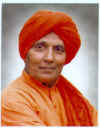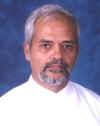|
Page 1 of 4
Peace in South Asia - is it
attainable?
the-south-asian
asks Swami Agnivesh
&
Rev. Valson Thampu


Swami Agnivesh & Rev. Valson Thampu
"PEACE IS NATURAL; WAR IS CONTRIVED"
|
A Brief Introduction
Swami Agnivesh and Rev. Valson Thampu are the
collective voice of the oppressed and the poor in India.
Swami Agnivesh founded the Bandhua Mukti Morcha (movement against
bonded labor), and is the Chairperson of the UN Trust Fund on
Contemporary Forms of Slavery. An Arya Samaj actvist, he works with
leaders of all religious faiths, in countering and challenging the
social ills prevalent in the society. Prior to dedicating his life
to activism, Swami Agnivesh was a professor of business and law at
St.Xavier's College in Calcutta, and for a brief period was also the
Education Mnister of Haryana. He is the author of several books and
was awarded the Anti-Slavery International Award (London, 1990) and
Freedom and Human Rights Award (Bern, Switzerland, 1994). His
goal is to establish "a liberal, egalitarian society based on
tolerance and mutual accommodation" and is co-ordinating his
efforts to do so under the banner of 'Religions for Social Justice'
Rev. Valson Thampu is a member of the forum, ‘'Religion for
Social Justice’, and is also a faculty member of St. Stephen's
College (English Department), Delhi, since 1973. He is an ordained
minister of the Church of North India (CNI) and has a strong
interest in theological shift from religion to spirituality. He is
the author of several books and writes regularly for journals and
newspapers.
Shaken and jolted by the recent violence in Gujarat, Swami
Agnivesh and Rev. Valson Thampu coordinated and convened `Mil Ke
Chalo', a march between Ayodhya and New Delhi to "affirm
their commitment to Mahatma Gandhi's vision of India as a tolerant
and pluralistic society." |
Is peace in south Asia elusive or attainable?
Peace is attainable everywhere; it is a universal possibility. One of the
fatal misconceptions we have come to internalize is that war, violence and
conflicts are natural, whereas peace has to be labored after. The fact is
that the longing for peace is more fundamental to human nature than is the
taste for war. Even when we desire wars, we wish them to rage only at a safe
distance! Everyone knows that peace is a pre-condition for prosperity,
quality of life and dignity; whereas war devastates families and disables
economies. One of the enigmatic ironies in history is that we endorse
ruinous wars; whereas we remain indifferent to peace, which is basic to our
own well being. We are willing to make sacrifices for war, but unwilling to
pay the price for peace. This stems from a paradox that involves two
contradictory polarities in human nature. When we act as individuals, we are
keen to promote our interests and welfare. But when we act in groups we
happily endorse what is harmful to our own interests. This proves the
proverbial vulnerability of the masses to manipulation by demagogues.
Over the years, politicians and rulers have conspired to create the myth
that war is a necessary arbiter in international affairs. We have been made
to believe that there is no alternative to war; that it is a necessary evil.
Yet, in India we have a glorious counter-model: that of Ashoka, the Great.
It was by renouncing war and embracing non-violence, and not by perfecting
strategies of terror or weapons of mass destruction, that Ashoka became
great. It is possible to rule by love not less than by force. Politics may
prosper for a while with cruelty and oppression as instruments of state
policy; but there can be no genuine statesmanship without care and
compassion. The tragedy in the world, especially in South Asia, is that we
have a plethora of puny politicians, but hardly any statesmen of stature.
When politics refuses to rise above the art of self-perpetuation, commitment
to peace seems a liability rather than the guiding light of inspired
governance.
One thing is absolutely certain. Peace must become possible and endure in
South Asia, even if it seems elusive now. War and peace are simply the
products of collective choices. We can choose to live in peace as naturally
as we can choose to live in tension and conflict. The question to ask, then,
is if we in South Asia can grow enough to prefer peace to war. From every
criterion of judgment, the preference for violence is an unmistakable sign
of all-round backwardness. It points to moral backwardness because we
endorse war without the willingness to wage them ourselves. We push the poor
among us into the jaws of death and degrade their agony into euphoria or
humiliation, depending on the outcome of wars. It signals diplomatic
backwardness because wars result from the collapse of diplomacy. It also
signals economic backwardness because in developed societies war become
incrementally impossible, as the life of every citizen is deemed too
precious to be lost in war. In economically under-developed societies,
though, human life -especially the life of the poor- is deemed cheap, making
it possible to sacrifice thousands of them in senseless conflicts. War and
under-development comprise a vicious cycle. War perpetuates poverty and
poverty facilitates war. It is high time Asia broke out of this cycle of
self-damnation. It is because conflicts and disunity are endemic to Asia
that this most important region remains belittled on the periphery of
contemporary history. Peace must become possible in South Asia if this
region is to fully appropriate its enormous possibilities and claim its
rightful place in the global arena. India is historically and spiritually
suited to take the initiative in this matter. It is ridiculous for India to
covet a seat in the Security Council, without attaining a corresponding
regional status as an ambassador of peace.
next
page
Disclaimer |

